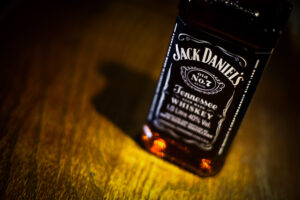Jack Daniels Takes on Dog Toy Trademark

Whiskey maker Jack Daniels is in a trademark fight that’s been going on for nearly a decade. VIP Products LLC manufactures a popular dog toy — known as “Bad Spaniels” — that looks almost identical to the iconic Jack Daniels rectangular bottle. While this may seem like a clear violation of trade dress, judicial disagreements have landed the case before the Supreme Court.
And now, the Biden administration has weighed in.
Jack Daniels vs Dog Toys
It only takes one look at the Bad Spaniels dog toy to see exactly where the idea for the product came from. It has an identical shape to the whiskey bottles created by Jack Daniels. The fake label says “Bad Spaniels” instead of Jack Daniels — and rather than the “Old No. 7” moniker, the dog toy label reads, “the Old No. 2, on your Tennessee Carpet.”
The dog toy clearly mimics the product created by Jack Daniels — a company whose first distillery opened over 150 years ago. However, does that mean it’s in violation of intellectual property laws? Could it create a likelihood of confusion among consumers, or perhaps result in trademark dilution of the more established brand?
The courts seem unable to agree.
The Supreme Court and Biden Administration
When Jack Daniels first took VIP Products LLC to court over their use of similar trade dress, the judge sided with the whiskey maker. However, the situation became more complex when a federal appeals court overturned the ruling. Their decision stated that the dog toy qualified as an expressive work, and since parody is protected, Jack Daniels did not have a case.
However, the big question is whether a dog toy can really be expressive. The creators of the product claim that it’s a comment on “the humanization of dogs in our lives” and the belief that “corporations take themselves very seriously.” These claims may seem outlandish, but the court decided that items didn’t need to reach high levels of expressiveness to have protection.
The entire case has garnered a good deal of attention in the intellectual property world. Can a commercial dog toy really be considered art, or is the creator merely pushing IP law to its limit to justify trademark infringement? The Biden administration seems to lean toward the latter, and it even filed a brief with the Supreme Court saying the toy manufacturer should not be immune.
What Happens Next?
In the brief filed with SCOTUS, the Biden administration states that the law “does not confer any right to use another person’s trademark, or a confusingly similar mark, as a source identifier for goods sold in commerce.” However, this doesn’t necessarily mean Jack Daniels will prevail in their effort. The Supreme Court is not beholden to opinions from the executive branch.
Clearly, this case will have huge implications for brands and what qualifies as parody and expressive art. However, it’s difficult to predict an outcome since even the courts clearly don’t agree on the issue. We’ll have to wait until SCOTUS hands down its decision — one which could lead to an industry of “expressive counterfeits.”
Who knows? By the time the case is resolved, we may know if every dog truly has his day.













